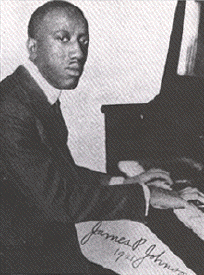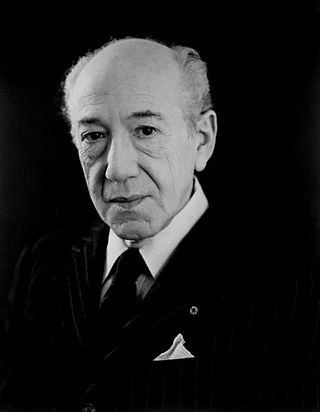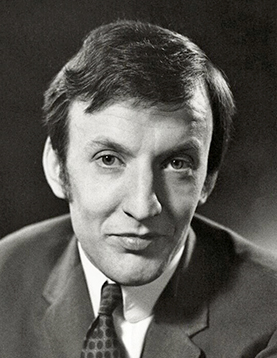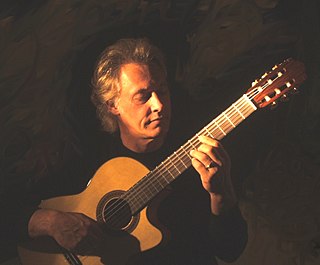
Ragtime, also spelled rag-time or rag time, is a musical style that had its peak from the 1890s to 1910s. Its cardinal trait is its syncopated or "ragged" rhythm. Ragtime was popularized during the early 20th century by composers such as Scott Joplin, James Scott and Joseph Lamb. Ragtime pieces are typically composed for and performed on piano, though the genre has been adapted for a variety of instruments and styles.

Ferdinand Rudolph von Grofé, known as Ferde Grofé was an American composer, arranger, pianist, and instrumentalist. He is best known for his 1931 five-movement symphonic poem, Grand Canyon Suite, and for orchestrating George Gershwin's Rhapsody in Blue for its 1924 premiere.

James Price Johnson was an American pianist and composer. A pioneer of stride piano, he was one of the most important pianists in the early era of recording, and like Jelly Roll Morton, one of the key figures in the evolution of ragtime into what was eventually called jazz. Johnson was a major influence on Count Basie, Duke Ellington, Art Tatum, Thelonious Monk, and Fats Waller, who was his student.

Charles Luckyth Roberts, better known as Luckey Roberts, was an American composer and stride pianist who worked in the jazz, ragtime, and blues styles. Roberts performed as musician, band/orchestra conductor, and dancer. He taught music and dance. He also owned a restaurant and bar in New York City and in Washington, D.C. Luckey Roberts noted compositions include "Junk Man Rag", "Moonlight Cocktail", "Pork and Beans" (1913), and "Railroad Blues".

David Leo Diamond was an American composer of classical music. He is considered one of the preeminent American composers of his generation. Many of his works are tonal or modestly modal. His early compositions are typically triadic, often with widely spaced harmonies, giving them a distinctly American tone, but some of his works are consciously French in style. His later style became more chromatic.

Sir Richard Rodney Bennett was an English composer of film, TV and concert music, and also a jazz pianist and occasional vocalist. He was based in New York City from 1979 until his death there in 2012.
Joseph Clyde Schwantner is a Pulitzer Prize-winning American composer, educator and a member of the American Academy of Arts and Letters since 2002. He was awarded the 1970 Charles Ives Prize.
Dan Welcher is an American composer, conductor, and music educator.
Raymond Wilding-White ; was an American composer of contemporary classical music and electronic music, and a photographer/digital artist.

William Lovelock was an English classical composer and pedagogue who spent many years in Australia. He was the first Director of the Queensland Conservatorium of Music in Brisbane, and later became the chief music critic for The Courier-Mail newspaper while developing an independent career as a composer.
Third stream is a music genre that is a fusion of jazz and classical music. The term was coined in 1957 by composer Gunther Schuller in a lecture at Brandeis University. There are many ways to define third-stream music. It could refer to a group of jazz musicians playing solely, or a jazz soloist performing with a symphony orchestra, as long as the musicians are able to interpret and play jazz music. Improvisation is generally seen as a vital component of third stream. In third-stream music, composers incorporated elements of classical music, such as the use of jazz instruments and classical music forms, into their jazz compositions. The fusion of jazz and classical music is also viewed as "born out of a reciprocal interest: the interest of the classical community in the developments in jazz music and the interest of the jazz community in the advances of classical music." The innovative idea of fusing jazz and classical music pushed the boundaries of traditional classical music and introduced a new genre that blends the two styles into a unique hybrid form.
John Musto is an American composer and pianist. As a composer, he is active in opera, orchestral and chamber music, song, vocal ensemble, and solo piano works. As a pianist, he performs frequently as a soloist, alone and with orchestra, as a chamber musician, and with singers.
Richard Collins St. Clair is an American composer, pedagogue, poet and pianist.
Alan Belkin is a Canadian composer, organist, pianist as well as a pedagogue.
David Chesky is an American pianist, composer, producer, arranger, and co-founder of the independent, audiophile label Chesky Records. He is also co-founder and CEO of HDtracks, an online music store that sells high-resolution digital music.

William Weiner is an Armenian–Israeli composer, violinist and vocalist; Meritorious Worker of Art of Armenia (2008); a member of the Israel Composers League (2013); president of the Jewish cultural center "Menorah" in Armenia (1994), and director of the Yerevan State Chamber Choir (2018).

Richard Gordon Flauding was an American arranger, composer, songwriter, and classically trained guitarist who has recorded several contemporary jazz and pop music albums and received an ASCAP Plus Award. His commissions include arrangements for guitar and orchestra, jazz ensembles, big band, contemporary jazz instrumentals, as well as choral and symphony productions. He has written, arranged, and recorded in many styles, including jazz and classical, and conducts professional and amateur jazz ensembles.

Richard Covey is a Canadian composer who is currently a sessional instructor in the Department of Music at the University of Prince Edward Island.

Miniature is a musical composition in five movements composed in 1948 by American composer William Grant Still. The composition was originally created for trio and was later, in 1963, arranged for quintet. The composition is about twelve minutes long.
Barbara Jazwinski is a Polish-American composer and pianist known for her contributions to contemporary music. She is Head of the Composition Program at the Newcomb Music Department, Tulane University in New Orleans. She was honored with the Prince Pierre of Monaco Composition Award for her work on the Sextet, and she also secured the top position in the Nicola De Lorenzo Composition Contest for her composition of Music for Chamber Orchestra.











